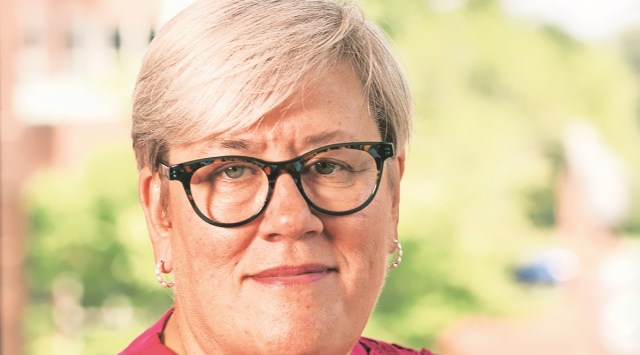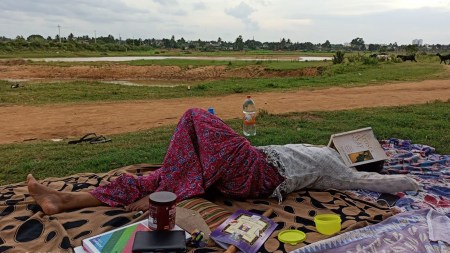
After attending COP27 in Sharm el-Sheikh, Egypt, Rachel Kyte, Dean of The Fletcher School at Tufts University, member of the UN Secretary-General’s High-Level Advisory Group on Climate Action, and advisor to the UK government for UN climate negotiations, spoke to Esha Roy about the evolving political landscape regarding climate change, progress made at COP27, and India’s G20 presidency.
During COP26 in Glasgow, India and China faced criticism for advocating “phase-down” rather than “phase out” of coal. India argues that the focus on coal alone, rather than all fossil fuels, is hypocritical of the West. What is your perspective on this?
At COP27, India has strongly advocated for language calling for the “phase down” of all fossil fuels. Leading up to COP26, there was a push to “phase out” coal and “phase down” other fossil fuels. This year, there is a subtle shift, with the agreement emphasizing the phase down of all fossil fuels to reflect the changed circumstances where distinctions between coal, gas, etc., are blurred.
The key issue lies in financing and supporting countries in transitioning to renewable energy and reducing their reliance on fossil fuels. If resources were not a concern, debates over phasing down or out and the allocation of responsibilities would not be as pronounced. The crux of negotiations lies in the question of finance.
The West is currently grappling with its own economic challenges and energy crises, aiming to ensure energy access for low-income individuals amidst conflicts and climate impacts worldwide. The focus should be on fulfilling the promise of $100 billion in climate finance and revamping the international financial system to facilitate access to necessary funds, whether public or private.
What advancements do you observe at COP27?
This year, there is a notable emphasis on institutional reform at the IMF and multilateral development banks to facilitate increased investment flow to countries on favorable terms. Prime Minister [at G20 summit] in Bali echoed the need for international institutions to adapt to the changing climate landscape.
The leadership of India at the G20 is crucial.
The pivotal question is how to attract substantial investments into renewable energy in countries like India within this decade, rather than decades later. The private sector requires support from development banks and multilateral institutions to take risks and invest. Despite the lack of urgency in negotiation language in Egypt, practical strategies are beginning to take shape. A strong Indian G20 presidency and the upcoming Brazilian presidency could further drive progress.
Do you support the concept of phasing down instead of phasing out?
While advocating for transitioning away from coal, it is crucial to address the social implications of coal phase-out in countries like India, extending beyond emissions. A gradual phase-out acknowledges the challenges faced by coal-dependent communities and prevents financial risks associated with stranded coal assets. International support is vital in facilitating alternative employment and training opportunities, as emphasized by Mr. Modi.
It is imperative to prevent new investments in coal infrastructure to protect vulnerable populations from the adverse effects of emissions. Prioritizing emission reduction in India benefits global efforts to combat climate change, highlighting the responsibility of developed nations to support developing countries in transitioning to renewable energy.
How has the conversation around Loss and Damages evolved?
Climate justice spans within and between countries, emphasizing the vulnerability of low-income populations to extreme weather events. The discussion encompasses subsidizing energy for underserved communities and the potential for compensatory measures to address climate-induced challenges. Recent commitments from European countries, Australia, and New Zealand towards Loss and Damages signify a shift towards acknowledging and addressing climate-related vulnerabilities.
Furthermore, discussions on climate debt swaps and redefining vulnerability criteria are underway to ensure equitable access to international funding for climate resilience. The need for financial support for at-risk communities underscores the urgency of adapting to the changing climate landscape.
How has climate altered the global political dynamics?
The global transition to renewable energy is reshaping the geopolitical landscape, with countries rich in renewable resources emerging as energy superpowers. Cooperation across sectors, particularly in health and private sector engagement, is essential for addressing complex challenges. The shift towards renewable energy sources will redefine global power dynamics and necessitate collaborative efforts for sustainable development.
What impact does the Ukraine conflict have on climate issues?
The EU’s decision to reduce reliance on Russian hydrocarbons has influenced Europe’s energy strategies, leading to short-term adjustments such as increased coal consumption. This shift towards renewable energy reflects a long-term commitment to energy security and efficiency. The global repercussions of the Ukraine conflict, including rising energy prices and inflation, underscore the interconnectedness of geopolitical events and climate outcomes.
Amidst challenges, the imperative to invest in renewable energy and mitigate emissions remains paramount for global sustainability. Addressing climate-related vulnerabilities and fostering international cooperation are essential for navigating the evolving climate landscape.
















